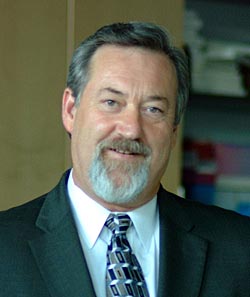|
"Building Temple's research enterprise — with its cascading benefits to the university, the city, the state and, through the advancement of knowledge, to all humankind — is one of the university's top priorities," President Hart said. "With his broad range of experiences at some of the nation's largest research institutions, Larry is the perfect leader to push research and research-related activity at Temple to new heights."
Lemanski became FAU's first vice president for research in 2001. Since then, FAU's classification by the Carnegie Foundation for the Advancement of Teaching has been elevated to "Research University–High Research Activity." Among many other accomplishments achieved under Lemanski's leadership, FAU established a division of research, including a new office of technology transfer, and significantly expanded the Florida Atlantic University Research Corporation; almost tripled its level of research funding; and entered into collaborative agreements with various scientific and research organizations, including the Scripps Research Institute, Torrey Pines Institute for Molecular Studies, Harbor Branch Oceanographic Institution and the U.S. Geological Survey. Lemanski is currently working on a collaborative agreement between FAU and the Germany-based Max Planck Society that would include provisions for joint faculty and student recruitment opportunities, courtesy faculty appointments and a formal framework for collaborative research.
During Lemanski's tenure, FAU also established two centers of excellence, one in biomedical and marine biotechnology that to date has secured $42 million in state, federal and private funding, and another in ocean energy technology that has been awarded $5 million in state funding.
Prior to joining FAU, Lemanski served as the associate vice president for research, professor of medical physiology and professor of biology at Texas A&M University from 1997 to 2001. From 1983 to 1997, he was chairman and professor of anatomy and cell biology at the State University of New York Upstate Medical University, where he founded and served as the first director for an interdisciplinary cell and molecular biology program. Lemanski has also held faculty appointments at Syracuse University (1987-1997); the University of Wisconsin, Madison (1977-1983); and the University of California, San Francisco (1975-1977).
"While I couldn’t be more proud of the research advancements made during my tenure at Florida Atlantic University, I am thrilled at the new challenge of joining Temple at a time when the university has created an extraordinary amount of momentum and energy," Lemanski said. "President Hart, Provost Staiano-Coico and the rest of Temple's new leadership team have a clear vision of research excellence and growth — and there's no better place in the world to do that than Philadelphia."
An accomplished and prolific researcher in cellular, molecular and developmental biology — primarily the embryology of animal heart development at the cellular and molecular level — Lemanski also will be a professor of anatomy and cell biology in Temple's School of Medicine with a secondary appointment in the Department of Biology in the College of Science and Technology.
Lemanski has authored or co-authored more than 280 research publications, book chapters, proceedings and meeting abstracts. He has served as principal investigator for more than $50 million in grant funding during his career. Lemanski has been funded continuously from the National Institutes of Health for more than three decades.
Based upon work funded by NIH, Lemanski recently had a patent issued, titled “Promoting Cardiac Cell Differentiation.”
Lemanski has served on many national and international committees, advisory boards and peer review panels, including the NIH Roadmap for Medical Research. He has been invited to lecture around the globe and has won numerous awards.
Lemanski holds a bachelor's degree in biology from the University of Wisconsin–Platteville. After earning a master's degree and a doctorate in zoology at Arizona State University, Lemanski was an NIH and Muscular Dystrophy Association postdoctoral fellow at the University of Pennsylvania.
|
